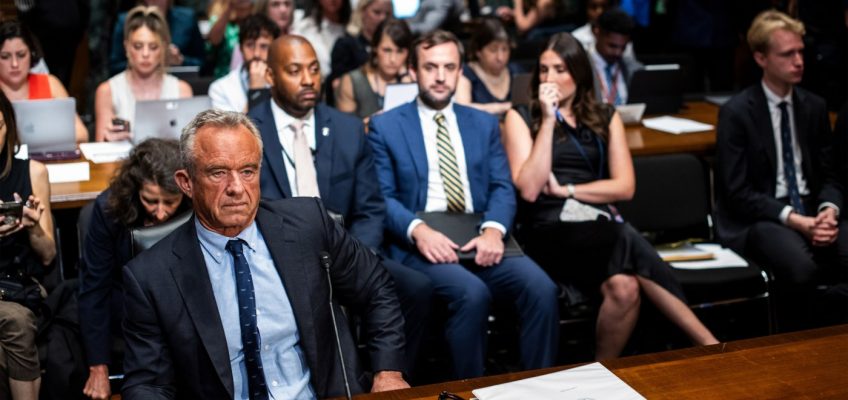A key federal vaccine advisory panel whose members were recently replaced by Health and Human Services Secretary Robert F. Kennedy Jr. is expected to vote to recommend delaying until age 4 the hepatitis B vaccine that’s currently given to newborns, according to two former senior Centers for Disease Control and Prevention officials.
“There is going to likely be a discussion about hepatitis B vaccine, very specifically trying to dislodge the birth dose of hepatitis B vaccine and to push it later in life,” said Demetre Daskalakis, former director of the National Center for Immunization and Respiratory Diseases. “Apparently this is a priority of the secretary’s.”
The vote is expected to take place during the next meeting of the CDC’s Advisory Committee on Immunization Practices, scheduled for Sept. 18-19.
For more than 30 years, the first of three shots of hepatitis B vaccine has been recommended for infants shortly after birth. In that time, the potentially fatal disease has been virtually eradicated among American children. Pediatricians warn that waiting four years for the vaccine opens the door to more children contracting the virus.
“Age 4 makes zero sense,” pediatrician Eric Ball said. “We recommend a universal approach to prevent those cases where a test might be incorrect or a mother might have unknowingly contracted hepatitis. It’s really the best way to keep our entire population healthy.”
In addition to the hepatitis B vaccine, the panel will also discuss and vote on recommendations for the combined measles, mumps, rubella, and varicella vaccine and covid-19 vaccines. Pediatricians worry changes to the schedules of these vaccines will limit access for many families, leaving them vulnerable to vaccine-preventable diseases.
Typically, ACIP would undertake an analysis of the data before recommending a change to vaccine guidelines. As of the end of August, this process had not begun for the hepatitis B vaccines, Daskalakis and another former official said.
“This is an atypical situation. There’s been no work group to discuss it,” Daskalakis said.
The second former senior official spoke to NPR and KFF Health News on the condition of anonymity.
In response to questions from KFF Health News, HHS spokesperson Andrew Nixon wrote, “ACIP exists to ensure that vaccine policy is guided by the best available evidence and open scientific deliberation. Any updates to recommendations will be made transparently with gold standard science.”
The draft agenda for the upcoming ACIP meeting was released to the public less than a week before it is scheduled to begin.
At the last ACIP meeting, in June, Martin Kulldorff, the chair and one of seven new members handpicked by Kennedy, questioned the need to vaccinate every newborn, citing only two of the many ways the virus can spread. Kulldorff is a former Harvard Medical School professor who became known for opposing some public health measures during the pandemic.
“Unless the mother is hepatitis B positive, an argument could be made to delay the vaccine for this infection, which is primarily spread by sexual activity and intravenous drug use,” he said.
The virus spreads via direct exposure to an infected bodily fluid like blood or semen. The disease has no cure and can lead to serious conditions like cirrhosis and liver cancer later in life. The CDC advisory panel may maintain the recommendation to inoculate newborns whose mothers have hepatitis B or are considered at high risk of the disease, the former officials said.
Related Articles
Trump extends TikTok shutdown deadline for fourth time after reaching framework deal with China
Republicans unveil a bill to fund the government through Nov. 21. Democrats call it partisan
Senate Democrats raise concerns over Pentagon plan to use military lawyers as immigration judges
Parents of teens who died by suicide after AI chatbot interactions to testify to Congress
Private school for Native Hawaiians vows to defend admissions policy from conservative strategist
Protection from birth
In 1991, federal health officials determined it was advisable for newborns to receive their first dose of the hepatitis B vaccine within 24 hours of birth, which blocks the virus from taking hold if transmitted during delivery. While parents may opt out of the shots, many day care centers and school districts require proof of hepatitis B vaccination for enrollment.
The prospect of ACIP’s altering the recommendation has left some people living with the virus deeply unsettled.
“I am goddamn frustrated,” said Wendy Lo, who has lived with the liver disease, likely since birth. Years of navigating the psychological, monetary, medical, and social aspects of chronic hepatitis B has touched almost every aspect of her life.
“I would not want anyone to have to experience that if it can be prevented,” she said. Lo learned she had the disease due to a routine screening to study abroad in college.
Lo credits the vaccines with protecting her close family members from infection.
“I shared with my partner, ‘If you get vaccinated, we can be together,’” she said. He got the vaccine, which protects him from infection, “so I’m grateful for that,” she said.
The CDC estimates half of people with hepatitis B do not know they are infected. It can range from an acute, mild infection to a chronic infection, often with few to no symptoms. Most people with chronic hepatitis B were born outside of the U.S., and Asians and Pacific Islanders followed by Black people have the highest rates of newly reported chronic infections.
When her children were born, Lo was adamant that they receive the newborn dose, a decision she says prevented them from contracting the virus.
The earlier an infection occurs, the worse the consequences, according to the CDC. When contracted in infancy or early childhood, hepatitis B is far more likely to become a chronic infection, silently damaging the liver over decades.
Those who become chronic carriers can also unknowingly spread the virus to others and face an increased risk of long-term complications including cirrhosis and liver cancer, which may not become evident until much later in life.
“Now I’m in my 50s, one of my big concerns is liver cancer. The vaccine is safe and effective, it’s lifesaving, and it protects you against cancer. How many vaccines do that?” Lo said.
Thirty years of universal vaccination
Treatments like the antivirals Lo now takes weren’t available until the 1990s. Decades of the virus’s replicating unchecked damaged her liver. Every six months she gets scared of what her blood tests may reveal.
After a vaccine was approved in the 1980s, public health officials initially focused vaccination efforts on people thought to be at highest risk of infection.
“I, and every other doctor, had been trained in medical school to think of hepatitis B as an infection you acquired as an adult. It was the pimps, the prostitutes, the prisoners, and the health care practitioners who got hepatitis B infection. But we’ve learned so much more,” said William Schaffner, a professor of infectious diseases at the Vanderbilt University School of Medicine and a former voting member of ACIP.
As hepatitis B rates remained stubbornly high in the 1980s, scientists realized an entire vulnerable group was missing from the vaccination regime — newborns. The virus is often transmitted from an infected mother to baby in late pregnancy or during birth.
“We may soon hear, ‘Let’s just do a blood test on all pregnant women.’ We tried that. That doesn’t work perfectly either,” Schaffner said.
Some doctors didn’t test, he said, and some pregnant women falsely tested negative while others acquired hepatitis B after they had been tested earlier in their pregnancies.
In 1991, Schaffner was a liaison representative to ACIP when it voted to advise universal vaccination for hepatitis B before an infant leaves the hospital.
“We want no babies infected. Therefore, we’ll just vaccinate every mom and every baby at birth. Problem solved. It has been brilliantly successful in virtually eliminating hepatitis B in children,” he said.
In 1990, there were 3.03 cases of hepatitis B per 100,000 people 19 years old or under in the U.S., according to the CDC.
Since the federal recommendation to vaccinate all infants, cases have dramatically decreased. CDC data shows that in 2022 the rate among those 19 or under was less than 0.1 per 100,000.
While hepatitis B is often associated with high-risk behaviors such as injection drug use or having multiple sexual partners, health experts note that it is possible for the virus to be transmitted in ordinary situations too, including among young children.
The virus can survive for up to seven days outside the body. During that time, even microscopic traces of infected blood on a school desk or playground equipment can pose a risk. If the virus comes into contact with an open wound or the mucous membranes of the eyes, an infection can occur. This means that unvaccinated children not considered at high risk can still be exposed in everyday environments.
Future access uncertain
If the CDC significantly alters its recommendation, health insurers would no longer be required to cover the cost of the shots. That could leave parents to pay out-of-pocket for a vaccine that has long been provided at no charge. Children who get immunizations through the federal Vaccines for Children program would lose free access to the shot as soon as any new ACIP recommendations get approved by the acting CDC director.
The two former CDC officials said that plans were underway to push back the official recommendation for the vaccine as of August, when they both left the agency, but may have changed.
Schaffner is still an alternate liaison member of ACIP, and hopes to express his support for universal newborn vaccination at the next meeting.
“The liaisons have now been excluded from the vaccine work groups. They are still permitted to attend the full meetings,” he said.
Schaffner is worried about the next generation of babies and the doctors who care for them.
“We’ll see cases of hepatitis B once again occur. We’ll see transmission into the next generation,” he said, “and the next generation of people who wear white coats will have to deal with hepatitis B, when we could have cut it off at the pass.”
KFF Health News is a national newsroom that produces in-depth journalism about health issues and is one of the core operating programs of KFF — the independent source for health policy research, polling and journalism.
©2025 KFF Health News. Distributed by Tribune Content Agency, LLC.




